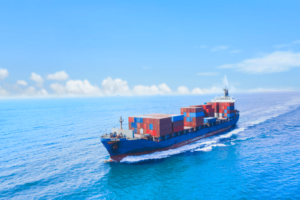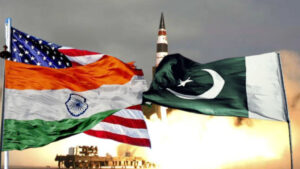Questioning China’s Silence Over Red Sea Maritime Crisis?

By Behrawar Shahnawaz
As most of the world scrambles to find a solution to the conflict in the Gaza Strip, the world elite uses the conflict as a smokescreen to engage in a dangerous brinkmanship game the international seas. In the Red Sea, the pro-Palestinian militia, known as the Houthis, are hijacking ships in an effort to force Israel to end its war in Palestine. Maritime Shipping, which plays a vital role in global trade, is under strain due the instability caused by attacks on the merchant ships by the Houthis in the Gulf of Aden and Red Sea. It is a mandatory passage for ships passing through the Suez Canal.
The attacks, that rely on sophisticated equipment like drones and missiles, backed by Iran have triggered a response from the US and UK militaries and raised concerns that the conflict could intensify. Thus, access to one of the world’s most vital shipping routes now appears more dangerous than ever, raising questions about the future of maritime commerce in the region and jeopardizing trade interests along the waterway of nations like China. The Chinese analysts describe this passage as their “maritime lifeline”. With the continuous attacks on merchant ships by clergy-backed Houthis that have ceased global trade, Beijing has stayed silent on the crisis despite Western pressure.
Significance of This Passage
The Red Sea passage, is a substitute to the Cape of Good Hope. As it is linked to the Suez canal, it is one of the most crowded shipping lanes in the world. It is a vital transit for the stability in politics and economy of many states. The Red Sea’s geopolitical significance stems from its role as a 355-kilometer natural barrier between Africa’s eastern and Arabian Peninsula’s western coastlines. It also serves as a vital route for unsecured oil transportation, industrial supplies, and food products. The Red Sea route accounts for roughly 10-12% of total the world’s commerce and 30% of container trade. As a result of the attacks, many of the world’s leading shipping companies have decided to move their container ships out of the region, fueling fears that another worldwide supply chain crisis could be on the horizon.
Global Consequences
The Red Sea is one of the world’s primary shipping corridors, carrying one-third of all container freight. Any sustained disturbance in trade there could cause an effect of greater prices across the globe. Because of the recent attacks and the fear of future assaults, 300 vessels, avoid red sea to evade attacks by Yemeni rebels. According to the Flexport INC, they were forced to take the much longer route from Africa, which can cost $1m more in fuel costs. Rerouting vessels around Cape of Good Hope adds further 3500 miles to shipping lanes, requiring more fuel. But continuing to use the Red Sea would raise insurance premiums. Either option would bruise an already wrecked global economy. Moreover, there is also the possibility that the outage could drive up the cost of crude.
In addition, the prevailing turmoil has halted the cargo of grains and other critical agricultural products from Europe, Moscow, and Kyiv. This can raise expenses of purchased goods for consumers and lower prices paid to producers, posing dangers to already vulnerable food security in some countries, particularly those that rely on food from abroad. On January 26, Jan Hoffman, a United Nations shipping expert, cautioned that Red Sea shipping obstacles presented a threat to global food security by declining grain distribution to parts of Africa and Asia that rely on wheat from Europe and the Black Sea region. Nations that rely heavily on imports like these might encounter food security issues that affect nutrition and stability.
China Has a lot at Stake
Red Sea is one of the world’s most significant maritime paths. China, in specific relies primarily on the waterway for freight transport from Asia to Europe. China’s economy, struggling to recover after the pandemic, is at risk if the shipping channels are further compromised. An International logistics firm based in San Francisco says 90% of cargo shipped from China to Europe used to travel across the Red Sea, but now deviate around Africa. Further adding extra travel time and substantially increases shipping costs. As a consequence of the vessel rerouting, and resulting delays in shipments, factories across Europe have had to suspend operations, putting additional pressure on Chinese trade. Moreover, due to the disruption, ocean freight rates from Shanghai to Europe soared more than 300% between November to January, according to the Shanghai Shipping Exchange presenting a big challenge to traders in an already clobbered economy. However, cost-benefit calculations so far demonstrate that Houthi attacks on maritime vessels have barely affected Chinese trade.
Why is Beijing Silent?
Since the beginning of the Israel-Hamas conflict, Beijing has expressed its solidarity with the Palestinian cause while condemning the Jewish state and its allies for the humanitarian crisis in Gaza. Chinese officials repeatedly stressed that the Red Sea security crisis is a “spillover” from the war in Gaza, wanting an immediate ceasefire between Israel and Hamas as the top priority. While China has opted for a low-profile response, Washington is counting on China to push Iran which provides training, finance, and equipment to the Yemeni militants to curb the attacks. However, The Iranian Foreign Ministry refuted reports that China had called on Tehran to pressure Houthi militants in Yemen to halt attacks on cargo ships transiting through the Red Sea.
China does not want to be part of an American coalition. In fact, being part of the force with the US will only strengthen Washington’s position, which is precisely what China wants to avoid. While giving an interview Chaziza, a senior lecturer at Ashkelon College in Tel Aviv asserted “this is because it will make the US more powerful in the region and weaken China’s position globally”. Beijing believes that partnering with the US will send the wrong signal to the wider Arab world, in which China has already established itself as a powerful rebutting force to Washington. More specifically, China expects that regional instability will further reduce American influence and further isolate the US over its involvement in the Gaza and Ukraine wars.
In addition, it is still ambiguous to what extent Beijing can compel Tehran. Although both states have pushed for closer economic and political ties, China was expected to exert pressure on the Islamic Regime when needed. China can exploit Iran because it is the biggest buyer of Iranian oil. It is also among the few states who can invest in billions in Tehran in the near term, enough to stabilize its economy. However, officials within the establishment stated that “Beijing’s influence on Tehran’s geopolitical decisions was not absolute”. China cannot change the calculus of Tehran as other factors like regional alliances, ideology, priorities play an important role in Tehran’s decision making as well.
Conclusion
As the crisis deepens the world eyes China, the major power broker in the Middle East with its cautious stance towards Gaza crisis. Beijing has taken neutral response since the wake of the conflict. It hesitated to participate fully even though it had a military base in Djibouti due to a shortage of military capability.
Despite Chinese pressure on Tehran to bring down the Houthis, the Yemeni group has declined to cease its offensives in the seas. It may indicate Beijing’s limited impact on Iran, revealing Tehran’s inability to control the Houthis. Forcing Tehran may not alter Houthi behavior. Likewise, the continued Houthi attacks would thus jeopardize China’s commercial objectives in the region and elsewhere. This has sapped China’s ability to assume an integral part in reducing rising hostilities. China’s failure on this diplomatic front might significantly harm its image and credibility as a major player in the region. Beijing’s overreach into the Palestinian cause will exacerbate its strained relations with Tel Aviv, its primary trade partner. Simultaneously, relations with Arabs and the clerics in Iran will improve attracting more investment in near future. The Red Sea maritime warfare has also cast doubt on Chinese President Xi’s “Global Security Initiative”, which it has defined as “China’s response to security challenges posed by the American security umbrella”. The Red Sea crisis demonstrates that China’s security proposals are unlikely to succeed when hard military measures are required.
Although China likes to advertise itself as a rising global power, and it likes to poke the United States for falling short of its global ambitions to secure peace and prosperity. Beijing’s role as a key regional player has been undermined with its silence and unwillingness to act will only benefit the West.

Behrawar Shahnawaz

The Duality of U.S. Policy in South Asia
The recent U.S. sanctions on Pakistan’s missile program, coupled with unsubstantiated claims of its targeting the U.S., reflect a broader geopolitical strategy aimed at undermining Pakistan’s strategic autonomy while selectively favoring India’s missile advancements, thereby exacerbating regional power imbalances in South Asia.

The BRICS Challenge: Can 100% Tariffs Save the U.S. Dollar?
Trump’s 100% tariff threat on BRICS may backfire, accelerating de-dollarization, sparking trade wars, and undermining U.S. economic dominance globally.

Threat Towards Nuclear Safety and Security Amid Global Tensions
Global nuclear safety is increasingly at risk amid rising international tensions. While India and Pakistan exhibit restraint with nuclear infrastructure agreements, superpowers like the U.S. and Russia escalate conflicts by targeting strategic facilities. This disparity emphasizes the need for global nuclear safeguards to prevent potential catastrophes from intentional or accidental nuclear incidents.

The SCO Summit in Pakistan: Opportunity or Challenge?
The upcoming SCO Summit presents Pakistan with a crucial opportunity to enhance its global standing, but also significant challenges. Missteps in handling political instability or countering India’s narrative could backfire. To seize this moment, Pakistan must skillfully manage relations with key players like China, Iran, and Russia while diplomatically addressing India’s criticisms. A well-crafted, strategic approach is essential to turning these challenges into long-term foreign policy gains for the country.

Indian Occupied Jammu and Kashmir Elections 2024: A Mere Façade?
The article argues that 2024 elections in Indian Illegally Occupied Jammu and Kashmir are seen as a façade, aimed at diverting the region’s freedom movement amid ongoing human rights violations and central government control following the abrogation of Articles 370 and 35A.

Industry, Innovation and Infrastructure: Building A Foundationally Sound Pakistan
This article investigates Pakistan’s position within Sustainable Development Goal (SDG) 9, “Industry, innovation and infrastructure.” It explores Pakistan’s in developing a robust industrial base, fostering innovation and establishing a sustainable infrastructure network. Through key government initiatives like “Digital Pakistan” and the National Transport Policy, Pakistan’s role maintaining its commitment to SDG 9 is highlighted. Additionally, it explores the potential challenges in addition to their possible solutions that Pakistan face in its journey to Goal 9.

